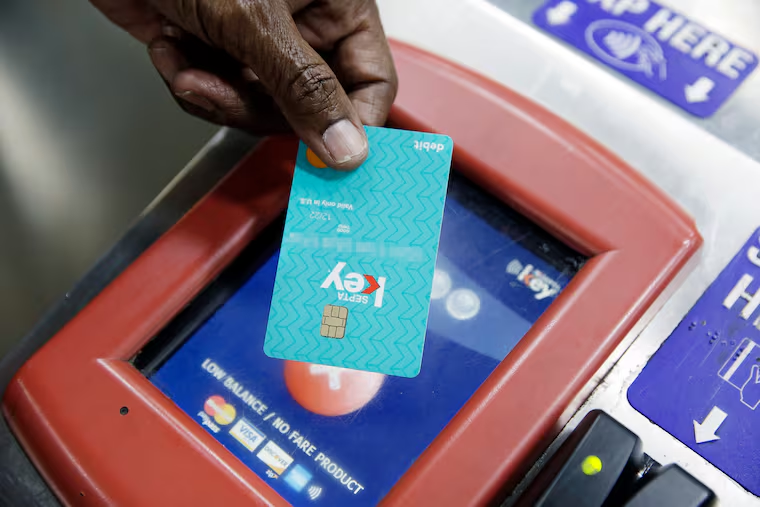Is your SEPTA Key card expiring in July? Brace yourself.
July 31 is the last stop for almost 40,000 SEPTA Key cards. And for riders with a balance still on their cards, transferring that money to a new one won’t be easy.

If you’re one of the nearly 40,000 people whose SEPTA Key cards expire in July, there are just a few steps you’ll have to take to replace it.
SEPTA won’t automatically send you a new card. You’ll need to buy one at the kiosks at subway and Regional Rail stops in Philadelphia. It’ll cost you almost $10, though that money will go toward transit fare if you register the card on SEPTA’s Key card website. And if you have a weekly or monthly transit plan, just select that again for your new card and you’re done.
Oh, wait, there’s more.
If you have a travel wallet — the E-ZPass-like function that allows you to maintain a balance on your fare card by linking it to your bank account — and want to transfer a balance from the expiring card to the new one, you’ll have to go to SEPTA headquarters or the Jefferson, 30th Street, Temple University, 15th Street, 69th Street, Frankford, or Olney stations, where a staffer can transfer the balance.
Sure, it would be more convenient if you could transfer your balance on your own time, on your own computer, at www.septakey.org, like most other cards allow. But that isn’t possible with SEPTA just yet.
“We know that’s something customers want, and we’re discussing it,” said Andrew Busch, SEPTA’s spokesperson, somewhat apologetically. “We do understand that is going to be not even just a matter of convenience for customers, but it’s really what people expect to be able to do.”
>>READ MORE: Meet the most influential man in Pennsylvania you’ve never heard of
SEPTA Key cards, the transit agency’s smart fare cards, expire after three years under an arrangement with MasterCard, which allows SEPTA to offer a debit card function through the card. An expiration date is an industry standard for fare cards, SEPTA said. The first batch of cards was issued in 2016 to early adopters, and on July 31, 39,386 Key cards will stop functioning.
Cardholders with monthly passes will be forced to buy new cards after they get their July fare plan, and weekly pass holders will have to get a new card after July 29, Busch said. Riders with those plans will be able to re-up their usual fare plan after getting a new card.
But 35,721 of the cards due to expire are linked to travel wallets.
Busch acknowledged that it might be easier to shut down the automatic withdrawal function for the card, use up the money on it, and then set up a travel wallet for a new card.
SEPTA isn’t entirely sure how many of those cards are still in use, though. There are 14,589 carrying a balance of $5 or less, which SEPTA said could indicate a card that isn’t active.
The Key card is gradually replacing all other fare implements on SEPTA’s system. It is being rolled out on Regional Rail, but the process hasn’t gone smoothly. SEPTA has fielded a fair amount of criticism about the system: from troubles getting the cards to work on buses to a confusing, poorly functioning website, and the cards being difficult to use or prohibitively expensive for the city’s poor. And the cards don’t work yet for most travelers who pay SEPTA with pretax money withheld by their employers.
Also, the system has been far more expensive than planned. The primary contractor, Conduent, has charged SEPTA about $172.2 million, $50 million more than was anticipated when the work began in 2011.
SEPTA has tried to respond to the complaints. The website recently got a makeover and now is much easier to use. The $5 minimum balance required to buy a Key card has earned complaints from advocates for the poor, and SEPTA is now testing a $1 minimum for new cards at stations at 52nd Street and Olney, Busch said.
There’s no timetable, but, he said, SEPTA also will work to make handling the cards’ expiration easier for riders, too.
“We know we would like to find a better way to do it in the future,” Busch said.